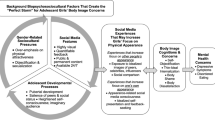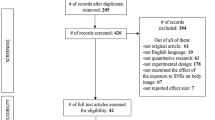Abstract
Emotional experiences (positive and negative affect) profoundly influence adolescents’ health and psycho-social functioning. Both positive and negative affect are important for well-being. However, few studies have examined different contributions of positive and negative affect to adolescents’ well-being in a global context. Using a dataset derived from the PISA 2018 survey, this study examined the association between emotional experiences and adolescents’ well-being (physical, hedonic, and eudaimonic well-being), and the moderating role of individualistic cultural value in the abovementioned relationships. The sample sizes (69,502 adolescents from 8 societies when physical well-being was the outcome,413,974 adolescents from 66 societies when eudaimonic well-being was the outcome, and 421,136 adolescents from 67 societies when hedonic well-being was the outcome) were large enough for sound conclusions. The results showed that positive affect was positively associated with all well-being indicators (physical, hedonic, and eudaimonic well-being), while negative affect was negatively associated with all well-being indicators. The results of the relative weighting analyses showed that positive affect contributed more strongly to adolescents’ well-being than negative affect. In addition, multilevel analyses showed that individualism increases the association of positive affect, but decreases the association of negative affect, and adolescents’ eudaimonic and hedonic well-being. These findings suggest that positive affect may be more closely associated with adolescents’ well-being than negative affect. The effects of emotional experiences on well-being can be moderated by culture.


Similar content being viewed by others
Data Availability
All data are from publicly available datasets and sources have been declared. Some additional data have been placed in supplementary materials.
References
Acevedo-Mesa, A., Rosmalen, J. G., Ranchor, A. V., & Roest, A. M. (2019). Positive affect and functional somatic symptoms in young adults. Journal of Psychosomatic Research, 127, 109847. https://doi.org/10.1016/j.jpsychores.2019.109847.
An, S., Ji, L. J., Marks, M., & Zhang, Z. (2017). Two sides of emotion: Exploring positivity and negativity in six basic emotions across cultures. Frontiers in Psychology, 8, 610. https://doi.org/10.3389/fpsyg.2017.00610.
Bastian, B., Kuppens, P., De Roover, K., & Diener, E. (2014). Is valuing positive emotion associated with life satisfaction? Emotion, 14(4), 639. https://doi.org/10.1037/a0036466.
Cameron, D. S., Bertenshaw, E. J., & Sheeran, P. (2015). The impact of positive affect on health cognitions and behaviours: A meta-analysis of the experimental evidence. Health Psychology Review, 9(3), 345–365. https://doi.org/10.1080/17437199.2014.923164.
Casas, F., & González-Carrasco, M. (2020). The evolution of positive and negative affect in a longitudinal sample of children and adolescents. Child Indicators Research, 13(5), 1503–1521. https://doi.org/10.1007/s12187-019-09703-w.
Cheung, F., & Lucas, R. E. (2014). Assessing the validity of single-item life satisfaction measures: Results from three large samples. Quality of Life Research, 23(10), 2809–2818. https://doi.org/10.1007/s11136-014-0726-4.
Delle Fave, A., Brdar, I., Freire, T., Vella-Brodrick, D., & Wissing, M. P. (2011). The eudaimonic and hedonic components of happiness: Qualitative and quantitative findings. Social Indicators Research, 100(2), 185–207. https://doi.org/10.1007/s11205-010-9632-5.
Diener, E., Lucas, R. E., & Oishi, S. (2002). Subjective well-being: The science of happiness and life satisfaction. Handbook of Positive Psychology, 2, 63–73.
Diener, E., Oishi, S., & Lucas, R. E. (2003). Personality, culture, and subjective well-being: Emotional and cognitive evaluations of life. Annual Review of Psychology, 54(1), 403–425. https://doi.org/10.1146/annurev.psych.54.101601.145056.
Diener, E., Oishi, S., & Tay, L. (2018). Advances in subjective well-being research. Nature Human Behaviour, 2(4), 253–260. https://doi.org/10.1038/s41562-018-0307-6.
Dolbier, C. L., Webster, J. A., McCalister, K. T., Mallon, M. W., & Steinhardt, M. A. (2005). Reliability and validity of a single-item measure of job satisfaction. American Journal of Health Promotion, 19(3), 194–198. https://doi.org/10.4278/0890-1171-19.3.194.
Fernández-Abascal, E. G., & Martín-Díaz, M. D. (2021). Longitudinal study on affect, psychological well-being, depression, mental and physical health, prior to and during the COVID-19 pandemic in Spain. Personality and Individual Differences, 172, 110591. https://doi.org/10.1016/j.paid.2020.110591.
Friedman, H. S., & Kern, M. L. (2014). Personality, well-being, and health. Annual Review of Psychology, 65(1), 719–742. https://doi.org/10.1146/annurev-psych-010213-115123.
Gallup (2019). Global emotions report Available from https://www.gallup.com.
Giuntoli, L., Condini, F., Ceccarini, F., Huta, V., & Vidotto, G. (2021). The different roles of hedonic and eudaimonic motives for activities in predicting functioning and well-being experiences. Journal of Happiness Studies, 22(4), 1657–1671. https://doi.org/10.1007/s10902-020-00290-0.
Govorova, E., Benítez, I., & Muñiz, J. (2020). Predicting student well-being: Network analysis based on PISA 2018. International Journal of Environmental Research and Public Health, 17(11), 4014. https://doi.org/10.3390/ijerph17114014.
Guo, Q., Zheng, W., Shen, J., Huang, T., & Ma, K. (2022). Social trust more strongly associated with well-being in individualistic societies. Personality and Individual Differences, 188, 111451. https://doi.org/10.1016/j.paid.2021.111451.
Harmon-Jones, E., & Harmon-Jones, C. (2021). On defining positive affect (PA): Considering attitudes toward emotions, measures of PA, and approach motivation. Current Opinion in Behavioral Sciences, 39, 46–51. https://doi.org/10.1016/j.cobeha.2021.01.008.
Hofstede, G., Hofstede, G. J., & Minkov, M. (2010). Cultures and organizations: Software of the mind (3rd ed.). McGraw-Hill.
Hox, J. (2010). Multilevel analysis: Techniques and applications. Routledge.
Human Development Index (2015). Public data explorer Retrieved from https://ourworldindata.org/human-development-index.
Huta, V., & Waterman, A. S. (2014). Eudaimonia and its distinction from hedonia: Developing a classification and terminology for understanding conceptual and operational definitions. Journal of Happiness Studies, 15(6), 1425–1456. https://doi.org/10.1007/s10902-013-9485-0.
Joshanloo, M. (2019). Cultural religiosity as the moderator of the relationship between affective experience and life satisfaction: A study in 147 countries. Emotion, 19(4), 629. https://doi.org/10.1037/emo0000469.
Jovanović, V., & Gavrilov-Jerković, V. (2016). The structure of adolescent affective well-being: The case of the PANAS among Serbian adolescents. Journal of Happiness Studies, 17(5), 2097–2117. https://doi.org/10.1007/s10902-015-9687-8.
Kern, M. L., Waters, L. E., Adler, A., & White, M. A. (2015). A multidimensional approach to measuring well-being in students: Application of the PERMA framework. The Journal of Positive Psychology, 10(3), 262–271. https://doi.org/10.1080/17439760.2014.936962.
Keyes, C. L. (2002). The mental health continuum: From languishing to flourishing in life. Journal of Health and Social Behavior, 207–222. https://doi.org/10.2307/3090197.
Kööts-Ausmees, L., Realo, A., & Allik, J. (2013). The relationship between life satisfaction and emotional experience in 21 European countries. Journal of Cross-Cultural Psychology, 44(2), 223–244. https://doi.org/10.1177/0022022112451054.
Kormi-Nouri, R., Farahani, M. N., & Trost, K. (2013). The role of positive and negative affect on well-being amongst Swedish and Iranian university students. The Journal of Positive Psychology, 8(5), 435–443. https://doi.org/10.1080/17439760.2013.823511.
Kuppens, P., Realo, A., & Diener, E. (2008). The role of positive and negative emotions in life satisfaction judgment across nations. Journal of Personality and Social Psychology, 95(1), 66. https://doi.org/10.1037/0022-3514.95.1.66.
Lakes, K. D. (2013). Restricted sample variance reduces generalizability. Psychological Assessment, 25(2), 643–650. https://doi.org/10.1037/a0030912.
Lampropoulou, A. (2018). Personality, school, and family: What is their role in adolescents’ subjective well-being. Journal of Adolescence, 67, 12–21. https://doi.org/10.1016/j.adolescence.2018.05.013.
Leu, J., Wang, J., & Koo, K. (2011). Are positive emotions just as positive across cultures? Emotion, 11(4), 994. https://doi.org/10.1037/a0021332.
Ma, X., Tamir, M., & Miyamoto, Y. (2018). A socio-cultural instrumental approach to emotion regulation: Culture and the regulation of positive emotions. Emotion, 18(1), 138. https://doi.org/10.1037/emo0000315.
Macias, C., Gold, P. B., Öngür, D., Cohen, B. M., & Panch, T. (2015). Are single-item global ratings useful for assessing health status? Journal of Clinical Psychology in Medical Settings, 22(4), 251–264. https://doi.org/10.1007/s10880-015-9436-5.
McCloughen, A., Foster, K., Kerley, D., Delgado, C., & Turnell, A. (2016). Physical health and well-being: Experiences and perspectives of young adult mental health consumers. International Journal of Mental Health Nursing, 25(4), 299–307. https://doi.org/10.1111/inm.12189.
Milfont, T. L., & Fischer, R. (2010). Testing measurement invariance across groups: Applications in cross-cultural research. International Journal of Psychological Research, 3(1), 111–130. https://doi.org/10.21500/20112084.857.
Miyamoto, Y., Ma, X., & Wilken, B. (2017). Cultural variation in pro-positive versus balanced systems of emotions. Current Opinion in Behavioral Sciences, 15, 27–32. https://doi.org/10.1016/j.cobeha.2017.05.014.
OECD (2019). PISA 2018 technical report. Paris: PISA, OECD Publishing.
Okely, J. A., Weiss, A., & Gale, C. R. (2018). The interaction between individualism and wellbeing in predicting mortality: Survey of Health Ageing and Retirement in Europe. Journal of Behavioral Medicine, 41(1), 1–11. https://doi.org/10.1007/s10865-017-9871-x.
Owens, T. J., Shippee, N. D., & Hensel, D. J. (2008). Emotional distress, drinking, and academic achievement across the adolescent life course. Journal of Youth and Adolescence, 37(10), 1242–1256. https://doi.org/10.1007/s10964-008-9319-2.
Oyserman, D., Coon, H. M., & Kemmelmeier, M. (2002). Rethinking individualism and collectivism: Evaluation of theoretical assumptions and meta-analyses. Psychological Bulletin, 128(1), 3. https://doi.org/10.1037/0033-2909.128.1.3.
Park, N. (2004). The role of subjective well-being in positive youth development. The Annals of the American Academy of Political and Social Science, 591(1), 25–39. https://doi.org/10.1177/0002716203260078.
Pflug, J. (2009). Folk theories of happiness: A cross-cultural comparison of conceptions of happiness in Germany andSouth Africa. Social Indicators Research, 92(3), 551–563. https://doi.org/10.1007/s11205-008-9306-8.
Pisano, I., & Lubell, M. (2017). Environmental behavior in cross-national perspective: A multilevel analysis of 30 countries. Environment and Behavior, 49(1), 31–58. https://doi.org/10.1177/0013916515600494.
Pressman, S. D., Gallagher, M. W., & Lopez, S. J. (2013). Is the emotion-health connection a first-world problem? Psychological Science, 24(4), 544–549. https://doi.org/10.1177/0956797612457382.
Pressman, S. D., Gallagher, M. W., Lopez, S. J., & Campos, B. (2014). Incorporating culture into the study of affect and health. Psychological Science, 25(12), 2281–2283. https://doi.org/10.1177/0956797614551573.
Pressman, S. D., Jenkins, B. N., & Moskowitz, J. T. (2019). Positive affect and health: What do we know and where next should we go? Annual Review of Psychology, 70, 627–650. https://doi.org/10.1146/annurev-psych-010418-102955.
Reker, G. T., & Wong, P. T. (1984). Psychological and physical well-being in the elderly: The Perceived Well-being scale (PWB). Canadian Journal on Aging/La Revue Canadienne Du Vieillissement, 3(1), 23–32. https://doi.org/10.1017/S0714980800006437.
Ruggeri, K., Garcia-Garzon, E., Maguire, Á., Matz, S., & Huppert, F. A. (2020). Well-being is more than happiness and life satisfaction: A multidimensional analysis of 21 countries. Health and Quality of Life Outcomes, 18(1), 1–16.
Salovey, P., Rothman, A. J., Detweiler, J. B., & Steward, W. T. (2000). Emotional states and physical health. American Psychologist, 55(1), 110. https://doi.org/10.1037/0003-066X.55.1.110.
Seligman, M. E., & Csikszentmihalyi, M. (2014). Positive psychology: An introduction. Flow and the foundations of positive psychology (pp. 279–298). Springer.
Sims, T., Tsai, J. L., Jiang, D., Wang, Y., Fung, H. H., & Zhang, X. (2015). Wanting to maximize the positive and minimize the negative: Implications for mixed affective experience in American and Chinese contexts. Journal of Personality and Social Psychology, 109(2), 292. https://doi.org/10.1037/a0039276.
Suh, E. M., & Choi, S. (2018). Predictors of subjective well-being across cultures. In E. Diener, S. Oishi, & L. Tay (Eds.), Handbook of well-being. DEF Publishers.
Tam, K. P., & Chan, H. W. (2018). Generalized trust narrows the gap between environmental concern and pro-environmental behavior: Multilevel evidence. Global Environmental Change, 48, 182–194. https://doi.org/10.1016/j.gloenvcha.2017.12.001.
Vittersø, J., Oelmann, H. I., & Wang, A. L. (2009). Life satisfaction is not a balanced estimator of the good life: Evidence from reaction time measures and self-reported emotions. Journal of Happiness Studies, 10(1), 1–17. https://doi.org/10.1007/s10902-007-9058-1.
Waterman, A. S., Schwartz, S. J., Zamboanga, B. L., Ravert, R. D., Williams, M. K., Bede Agocha, V., … & Brent Donnellan, M. (2010). The Questionnaire for Eudaimonic Well-Being: Psychometric properties, demographic comparisons, and evidence of validity. The Journal of Positive Psychology, 5(1), 41–61. https://doi.org/10.1080/17439760903435208.
World Bank (2020). World DataBank. Available from http://databank.worldbank.org.
Author information
Authors and Affiliations
Corresponding author
Ethics declarations
Conflict of interest
The authors declare that they have no confict of interest.
Competing interests
The authors report there are no competing interests to declare.
Ethical Approval
This research was conducted in accordance with the ethical guidelines of the local university and with the Ethical Standards of the 1964 Declaration of Helsinki.
Informed Consent
Informed consent was obtained from all participants at the time of PISA data collection.
Additional information
Publisher’s Note
Springer Nature remains neutral with regard to jurisdictional claims in published maps and institutional affiliations.
Rights and permissions
Springer Nature or its licensor (e.g. a society or other partner) holds exclusive rights to this article under a publishing agreement with the author(s) or other rightsholder(s); author self-archiving of the accepted manuscript version of this article is solely governed by the terms of such publishing agreement and applicable law.
About this article
Cite this article
Guo, Q., Zheng, W. & Han, Z. The Prevalence of Positive Affect over Negative Affect in Adolescents’ Well-being: Moderating Role of Individualism. J Happiness Stud 25, 32 (2024). https://doi.org/10.1007/s10902-024-00716-z
Accepted:
Published:
DOI: https://doi.org/10.1007/s10902-024-00716-z




